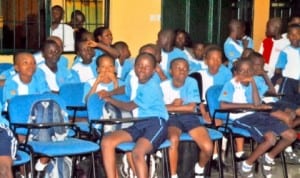Education
Reactions Trail Poor WAEC SSCE Results
Two weeks after the release
of the 2014 May/June Senior School Certificate Examination (SSCE) by the West African Examinations Council (WAEC), reactions have continued to trail the mass failure recorded in the performances of candidates.
Nigerians have expressed fears and indeed, loss of confidence at the secondary school levels of the education sector following the successive decline in the performances of candidates in the last five years.
Some principals, teachers and other stakeholders who spoke to The Tide on the mass failure attributed the cause to laxity and negligence in the parts of the various components of the sector with a call on all sides to rise to the occasion and nib the situation on the bud.
The Principal, Community Secondary School, Nkpor, Rumuolumeni, Mrs Whiliki J. A. stated that for Rivers State in particular the teachers are doing their best and blamed the situation on the students.
In her words “the teachers especially the newly employed came in with zeal and ready to work. They have fulfilled their part of the show but the students are not ready to learn and even read. They don’t know the difference between reading for examination and other things”.
Whiliki also blamed the situation on parents saying “parents are not helping matters either. They compel these students to use the time for their reading to sell for them not minding that these children have exams at hand. Teachers cannot do it all alone. If the parents fail to play their own part, then it won’t work”.
Expressing hopes of no further decline, she urged parents to partner with teachers and government whom she stated are faithful on their parts to encourage the students towards achieving excellent results in their both internal and external exams.
Another principal of Itans Academy, Iriebe, Mr Mike Uchenna was of the view that teachers have not exercise their best in turning out well read students who could face the WAEC exams independently.
Uchenna also stated that the supervisors and invigilators were almost serving as ‘threat’ to the students saying “the way they go about the invigilating thing put these students off their balance and they can no longer concentrate to write the exams which also contribute to this failure.
A teacher of Economics and Mathematics at the Community Secondary School, Amadi-Ama, Mrs Ikpoki Jonathan maintained that there are too many sides to the coin.
According to her, “one of the reasons is the government’s refusal to look into the welfare of these teachers particularly in the public schools. There is no conducive atmosphere for these teachers to carry out their teaching works.
Also, invigilators are asked to pay between 40 and 50 thousand naira for them to invigilate and so they in turn compel the students to pay same for the exams. Therefore, the children no more read but depend on the money they have paid”.
She continued “unfortunately, most of the people they used for this malpractice are jack of all trade with no definite area of specialisation and so, they can’t get it all right”.
An official of WAEC who pleaded anonymity opined that critical look at the failure reveals that it comes mainly from the Public School Sector.
“The Private Schools particularly with boarding system, take their time to train these students to read. There is no parental interference and the students are doing well.
Government needs to do a lot more for these public schools because right now, malpractice is what is killing these students. They have no confidence in themselves and so cannot pass the exam”.
It would be recalled that the WAEC penultimate Monday announced the release of the May/June 2014 results.
The Head of WAEC, National office, Lagos Mr Charles Eguridu while announcing the results revealed that out of 1,692,435 candidates who sat for the exam, 529,425 of them obtained credits in five subjects and above including English language and mathematics, a figure which he said represented 31.28 per cent, a poor performance in the overall percentage.
Education
Elga boss tasks law students on academics strides

Education
Association harps on importance of mother tongue in society

Education
UNIPORT Hails Odusote’s Historic Appointment as First Female Director-General of Nigerian Law School

-
Maritime4 days ago
Nigeria To Pilot Regional Fishing Vessels Register In Gulf Of Guinea —Oyetola
-

 Sports4 days ago
Sports4 days agoGombe-Gara Rejects Chelle $130,000 monthly salary
-
Maritime4 days ago
Customs Declares War Against Narcotics Baron At Idiroko Border
-

 Sports4 days ago
Sports4 days agoTEAM RIVERS SET TO WIN 4×400 ” MORROW” …Wins Triple jump Silver
-
Maritime4 days ago
NIMASA,NAF Boost Unmanned Aerial Surveillance For Maritime Security
-

 Sports4 days ago
Sports4 days agoNPFL Drops To 91st In Global League Rankings
-

 Sports4 days ago
Sports4 days agoNIGER DELTA GAMES PANACEA TO YOUTH DEV”
-

 Sports4 days ago
Sports4 days agoNPFL Impose Fines On Kwara United Over Fans Misconduct


